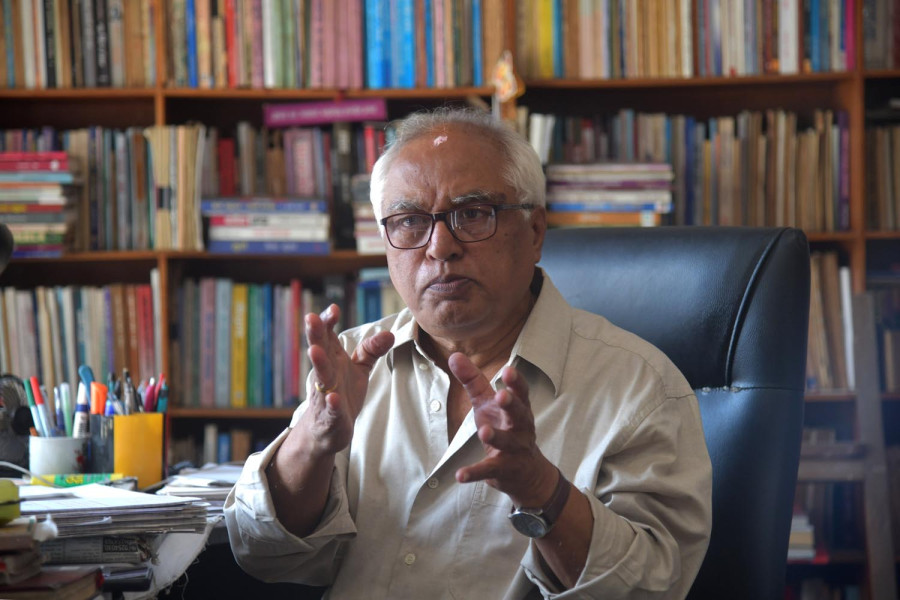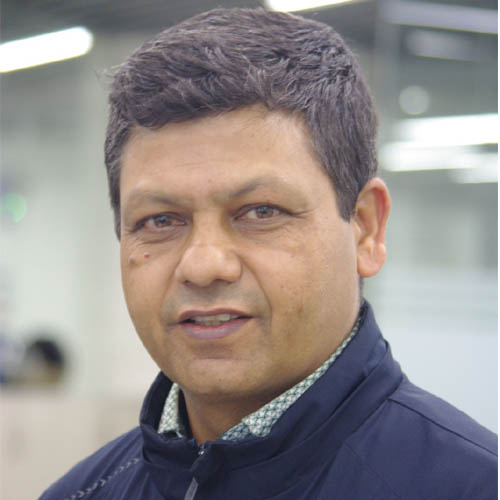Interviews
‘Nepali Congress today is not driven by the right values’
Historian Rajesh Gautam on the historical evolution of the Nepali Congress and its current course.
Thira Lal Bhusal
Historian Rajesh Gautam is the author of a seminal nine-volume history of Nepal’s democratic movement and Nepali Congress. He has closely followed the Grand Old Party’s tumultuous history since its formation in 1950. As the parliament’s largest party is in the middle of its Central Working Committee meeting in Kathmandu, the Post’s Thira Lal Bhusal sat down with Gautam for insights on the party’s historical evolution and its current course. Excerpts:
Can you briefly break down the historical evolution of the Nepali Congress?
When we talk about the evolution and role of the Nepali Congress, we have to break down its journey into two major periods. One, from its establishment 1950 up until 1960, when King Mahendra imposed a partyless Panchayat system, until the 1990 democratic changes; and two, the democratic period after 1990. One may further break down the post-1990 democratic period, from 1990 to 2006, and then the republic period to the date. The party’s role has changed depending on the political situation of those periods. Until 1960, the country's politics revolved around the Congress. The party led the revolution in 1951 and won two-thirds seats in the first general elections in 1959.
The struggle at the time was between democrats and monarchy. The Congress led the democratic movement and the king didn’t like it. Then King Mahendra not only dissolved the elected government and parliament but also imposed a party-less autocratic Panchayat system that lasted for three decades. The communist forces also emerged over the years. The people's movement in 1990 was jointly fought by Congress and communist forces. After that Nepalis overthrew monarchy. Now we are in a federal democratic republic system. And the Congress has been a major force in all these movements and has evolved with the changes in the country.
Some argue the Congress has deviated from its core values while others say it has evolved based on changed context? How do you see it?
Nepali people want their political parties to be guided by fundamental values. I don't think the Congress has of late been driven by right values. Some individual leaders and groups have prevailed. Their main objective is to fulfil their personal goals. Thus the party has become individualistic, devoid of principles and right programmes, and with a weak organisation. Factional practice isn’t new in the party. It was there even when BP Koirala led the party. But there is a difference. In the past, factions were formed based on certain agendas and policies. They disputed differences in ideas. The factions fought for certain principles. Not so today. Now we can find even family-based factions. Certain groups are formed just to reach leadership positions.
How do you see the current division in the party, between the establishment and rival factions?
This kind of division wasn't seen in the past. Even after 1990, Ganeshman Singh, Krishna Prasad Bhattarai and Girija Prasad Koirala led their own groups. But they didn't undermine the party’s system. Kishunji [Bhattarai] surrendered but didn't go against the party even as Koirala misbehaved with him.
When did the Congress leaders start undermining the party over self-interest?
Girija Prasad Koirala and Sher Bahadur Deuba led two factions and the latter split to form a new party in 2002. Though they later reunified the parties in 2007, factional activities had already been institutionalised. They started to share 60 percent seats for the establishment and 40 percent for the dissident side. This made the factions more powerful. The one who supposedly led the 40 percent always challenged the establishment. Factional practice was expected to end with party reunification. But that didn't happen. In the past, Deuba demanded 40 percent share with Girija Prasad, then Ramchandra [Paudel] ji demanded the same with Deuba and now Shekhar [Koirala] ji is staking the claim.
But doesn’t factional practice promote intra-party competition and make a democratic party more dynamic?
No, I don’t think so. It makes a party more dynamic only if those who lead the factions work honestly for the party’s benefit. But the leaders these days mostly want to claim their share in ministerial allocations and other key positions. We all know that Ramchandraji became [the country’s] President after intense bargaining. Now, the two general secretaries are also adopting the same tactics. On the surface, they seem to be raising some agenda but in fact all their activities are aimed at benefiting in power sharing. He [Gagan Thapa] is trying to project himself as future prime minister. We don't see any agenda-based debate. We see one set of arguments from the Deuba faction and counter-arguments from the rival side.
The Congress Central Working Committee members are divided over whether to suspend those implicated on corruption charges. How do you see this division?
Some of the speakers in the meeting argued that the leaders could not be suspended as they haven’t been convicted. But the party can suspend them from party positions until the court verdict. The establishment side believes such a move will weaken it while the other side thinks it would be advantageous to remove the accused leader. This is why I say their activities are guided by personal motives and the party is paying the price in terms of its sinking popularity.

Do you think the Congress compromised on its values by forging alliances with parties with contrasting ideologies?
A political party should stand firm in its policies and principles. It isn't unnatural to forge a coalition to form a government. But forging a coalition in an election is very unusual. The parties have lost the hearts and minds of the public but want to stay in power, for which they form an electoral alliance. This gives the message that the parties concerned are not confident. This trend weakens democratic parties and harms larger politics. Parties should be able to go to the people with their own agenda. But that's not happening. Deuba is focused on becoming prime minister one more time. He isn't bothered about the party's values and principles. The other side thinks that once it removes Deuba, it will be in power. More concerning is the party's diminishing influence among the younger generation. New parties are thus emerging based on youth support.
The Congress has emerged the largest party in the election. How can we say that it has weakened?
Assessing a party’s strength based only on the number of seats it wins isn’t right. A party's strength is better assessed based on its influence, agenda and popularity among the general public. One mustn't forget that the seats won in the latest election were with the coalition’s backing. As the party asked its traditional voters to vote for other coalition partners, principles-based politics took a knock. Even committed members were compelled to vote for other parties’ candidates.
How do you compare new parties’ emergence with the historical context of the emergence of the Congress and communist parties?
In the initial stage, people supported the Congress as it fought against Ranas and kings to establish democracy. The communists weren’t well organised in the 1950s. So the Congress won over two-thirds seats in the first parliamentary election in 1959. Scattered communist outfits started getting more organised from the 1960s. By the late 1980s, the left forces became stronger. Therefore, they emerged as a parallel force in the general elections in 1991. People now had options. Youths started ditching the Congress for multiple reasons. They were frustrated by the Congress government's failure to deliver and with its constant factional feuds.
Now, they are trying to find options in newer outfits. But the new parties don’t have any clear ideological ground or vision as to where they would lead the country. A party can't run only on a whim. Such confusion may lead the country to a serious political accident. The major political forces should introspect. At first, they should change themselves and try to get back youth support.
Are you suggesting the new forces aren't well-placed to run the country as they lack a clear vision?
A political party can't properly govern a country when it is driven mainly by a leader. Take the new party [Rastriya Swatantra Party] that decided to recall all its ministers from the Cabinet just because the party leader lost his government position. Recalling all its ministers wasn't necessary. But the leader thought that if he could not be a part of the Cabinet, none of his other party colleagues could either. He showed a dictatorial tendency, similar to Deuba's in Congress, KP Sharma Oli’s in CPN-UML, Kamal Thapa’s in RPP before he quit the party. This isn't good.
Do you think leadership handover will solve traditional parties’ problems?
The idea in itself is good but there is the right time for everything. It should be done through a proper process. For instance, Gagan Thapa and Bishwa Prakash Sharma can't just jump into the top Congress position. They must follow the process. One can't breach the party's system and set a bad precedent.
But some changes have become imperative. Haven’t they?
That's true. The new parties emerged by cashing in on people’s frustration with the same old faces. Nepali people always prefer new forces. Unfortunately, the new outfits look like they have no clarity about their destination. They seem guided by whims.
What should traditional parties such as Congress do now?
Its leaders must work hard to keep the party relevant. Otherwise, see what happened to the Nepal Praja Parishad, the country’s first political party that has now gone out of existence. The Congress may not face the same fate but it badly needs reforms. People are frustrated by corruption and factionism in the party. It is devoid of values and principles. Self-serving contractors and criminals are welcomed in the party. People have an impression that top leaders are all corrupt. To improve on this image, the party must suspend those implicated in corruption charges.




 13.12°C Kathmandu
13.12°C Kathmandu




.jpg&w=200&height=120)







